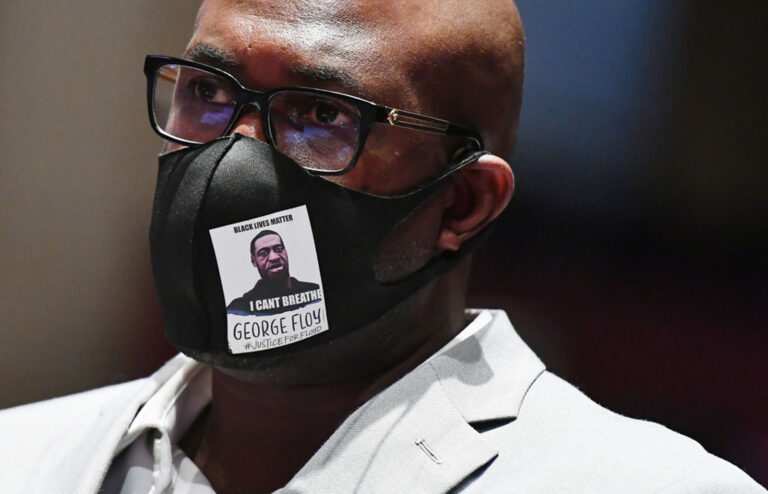
Minneapolis will pay a record $27 million to settle the lawsuit brought by George Floyd’s family.
Attorneys for the family called it the “largest pretrial settlement in a civil rights wrongful death case in U.S. history.”
“George Floyd’s horrific death, witnessed by millions of people around the world, unleashed a deep longing and undeniable demand for justice and change,” family attorney Ben Crump said in a statement. “That the largest pretrial settlement in a wrongful death case ever would be for the life of a Black man sends a powerful message that Black lives do matter and police brutality against people of color must end.”
Floyd’s sister Bridgett Floyd said in a statement that she was pleased “this part of our tragic journey to justice for my brother George is resolved … Our family suffered an irreplaceable loss May 25 when George’s life was senselessly taken by a Minneapolis police officer. While we will never get our beloved George back, we will continue to work tirelessly to make this world a better, and safer, place for all.”
After a roughly 40-minute private meeting Friday afternoon, City Council members voted unanimously to approve the settlement, and Mayor Jacob Frey’s office said he will approve it as well.
Of the $27 million, $500,000 will be used “for the benefit of the community around 38th and Chicago,” where Floyd died, according to the city.
“This is a deeply traumatic event that, unfortunately, is a part of too many Black and brown families’ realities,” Council Vice President Andrea Jenkins said after the vote. “There is no amount of money that can replace a brother, a son, a nephew, a father, a loved one but what we can do is continue to work towards justice and equity and equality in the city of Minneapolis and that’s what I commit to do.”
The settlement could have major implications for the city and its Police Department, whose fate hangs in the balance as some city leaders and community members seek to replace it.
Floyd’s family sued the city and the four officers charged in his death in July, just months after his death — and the video of former Officer Derek Chauvin kneeling on him — spurred protests across the world.
When they filed the suit, Crump said, “This is an unprecedented case, and with this lawsuit we seek to set a precedent that makes it financially prohibitive for police to wrongfully kill marginalized people — especially Black people — in the future.”
The federal suit accused the officers of a “reckless disregard” for Floyd’s civil rights, saying they used deadly force in nondeadly circumstances. It also alleged that the department engaged in a culture of “warrior-style” or “killology” training, failed to terminate dangerous officers and fostered a culture of racism, leading to a violation of Floyd’s civil rights.
In April 2019, Frey announced he was banning officers from receiving “fear-based” training. The police union quickly countered that it was partnering with a national police organization to offer free “warrior-style” training.
In July 2020, the Police Department announced it was changing its use-of-force policy to encourage officers to deescalate tense situations and hold them accountable when force or weapons are used. The new policy required officers to document how they tried to deescalate situations, why they decided to use force and why they chose a specific level of force.
Moments after the settlement vote Friday, Council President Lisa Bender read a statement: “I do want to, on behalf of the entire City Council, offer my deepest condolences to the family of George Floyd, his friends and all in our community who are mourning his loss. No amount of money can ever address the intense pain or trauma caused by this death to George Floyd’s family or the people of our city.”
The previous record for police payouts came in 2019, when the city agreed to pay $20 million to settle the lawsuit filed by the family of Justine Ruszczyk Damond. She was killed by former Minneapolis police Officer Mohamed Noor after she called to report a possible assault in an alley behind her south Minneapolis home.
From 2006 through 2020, Minneapolis paid just over $44 million to settle officer conduct claims and lawsuits, according to data posted on the city’s website and updated in January.
The civil suit is separate from the criminal trials for the four officers charged in his death. Jury selection began this week for Chauvin, who faces charges of second-degree murder, third-degree murder and manslaughter in Floyd’s death.
A separate trial for the other three former officers charged in his death — J. Alexander Kueng, Thomas Lane and Tou Thao — is set to begin Aug. 23. They face charges of aiding and abetting second-degree murder and manslaughter in Floyd’s death.
___
© 2021 StarTribune Distributed by Tribune Content Agency, LLC.
0 comments :
Post a Comment